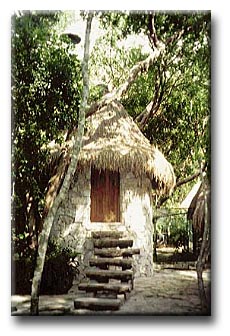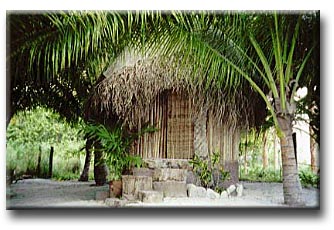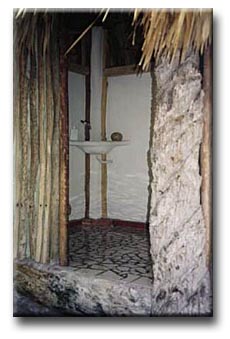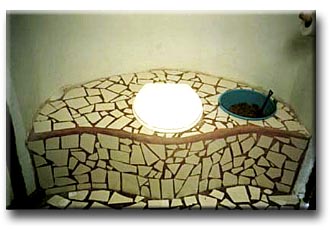Navigation
Enterprising Technology Transfer: The Puerto Morelos Composting Toilet Project
In 1993, The ReSource Institute for Low Entropy Systems (ReSource) started a sanitation and pollution prevention project in Puerto Morelos, Mexico that has composting toilets as its technological centerpiece.
Location:
Puerto Morelos, Mexico
Problem Overview:
Pollution due to human excreta
The state of Quintana Roo hosts one of Mexico's most well known tourism destinations, Cancun. Its tropical climate and emerald blue water has attracted tourists since it was officially designated a place for tourism-friendly development in 1967. Today nearly 2 million tourists a year visit Cancun, spilling out of the confines of the city and onto the coastal 300 km Cancun-Tulum tourism corridor.
Just south of Cancun is Puerto Morelos. It is said that Puerto Morelos is what Cancun looked like 30 years ago. Its clear Caribbean water and small town feeling beckon tourists and homesteaders alike. With its mangroves, the world's second largest barrier reef a twenty minute swim from its beaches, and an underground system of freshwater rivers underneath its limestone foundation, the town is steward to a rich and fragile ecosystem. But this ecosystem has been threatened in recent years by pollution and development. Growing in the shadow of Cancun, Puerto Morelos is struggling to avoid the rampant development and ensuing environmental degradation that taints its northern neighbor.
One source of pollution identified as a serious problem by local ecologists, health officials, and community members is human excreta filtering into the groundwater from latrines, septic tanks, and open-air defecation. At the city's request, the ReSource Institute introduced Puerto Morelos' first composting toilet and has mapped out a strategy for developing toilet systems and greywater treatment that prevent pollution of the groundwater and nutrient discharge into the groundwater, reefs, and mangroves while improving public health in Puerto Morelos' neighborhoods.
Background:
In 1993, The ReSource Institute for Low Entropy Systems (ReSource) started a sanitation and pollution prevention project in Puerto Morelos, Mexico that has composting toilets as its technological centerpiece. Two hundred ReSource Composting Toilets, modeled after the Clivus Multrum system, have been built in the area with local labor and materials.
 |
| ReSource composting toilet at Xcaret; Quintana Roo, Mexico |
ReSource has demonstrated that:
(1) the human waste management needs of communities with complex development issues and diverse household income levels can be met with ReSource Composting Toilets and greywater recycling systems; and
(2) once the technology is established, demand climbs beyond the capacity of community members involved in the "model" project to satisfy it without finding a way to manufacture and distribute the technology on a large scale. Investment capital, a corporate infrastructure, and trained personnel are required for the next phase of the technology transfer. Managed enterprise development by the people most familiar with the technology, in this case the ReSource Institute for Low Entropy Systems, is an appropriate course of action for scaling-up 21st century sanitation solutions to meet the demands of an ever more populated and sanitation-poor world.
The first composting toilet was built with local labor and materials in May 1993. It is called Baño Ecologico Nahi Xix (na' he sheesh) locally and a ReSource Composting Toilet (RCT) internationally. Community response to the RCT Nahi Xix has been enthusiastic.
 |
| The first ReSource composting toilet built in Puerto Morelos, Mexico in 1993. Made from local materials with local labor |
Mayans, who make up over half of the community and live in the town's inland confines, find the RCT an appropriate answer to ecological and public health problems and the difficulties of building a septic tank or latrine on the town's limestone foundation. The remaining community members, a mix of working class locals and wealthier visitors living on the beachfront, have found the toilets an good alternative to traditional disposal systems and a powerful example of ecological development.
The ReSource Composting Toilet Project in Puerto Morelos provides hygienic and odorless toilets in geographically challenging areas, for people without toilets or sub-standard facilities, and for people looking for an aesthetically pleasing and ecological sanitary facility. The toilets were first constructed for the poorest members of the Puerto Morelos community, but soon demand for them came from eco-tourism operators and wealthier homeowners up and down the coastline. They have been built for private homes and public facilities, for one to one hundred users. This grassroots initiative is steady progress toward Puerto Morelos' stewardship of its natural resources and protection of community public health.
Methodology:
The approach to establishing composting toilets and greywater recycling systems in Puerto Morelos include:
- Using proven technical design parameters
- Flexibility in degrees of design sophistication (i.e.; materials, size, energy needs, cost, micro-flush and waterless systems, appearance)
- Building for beauty; integrating the composting toilet into the living space, attention to detail, and standardizing the use of aesthetically pleasing components (such as bamboo walls, natural light and ventilation in the bathroom)
 |
| Hand washing sinks are integrated whenever possible inside ReSource bathrooms. This one is in a facility in Puerto Morelos, Mexico. |
- Institutionalized maintenance (not dependent on individual households)
- Community education - Emphasizing women's participation
- Marketing and outreach (creating demand)
- Training and certification of local builders for on-site construction (apprenticeship programs)
- Certification of qualified completed units
- Regional manufacturing of systems to efficiently and economically meet demand
- Supporting small businesses to fabricate parts, collect and use fertilizer end-products, and perform maintenance tanks
- Outreach to government and policymakers for support; interagency cooperation; and integration into public health, environmental, and infrastructure development efforts
 |
| A bench, made of broken tile, is easy to make and easy to clean. |
Enterprising Technology Transfer:
When ReSource does its job well, demand for its technologies soar. Composting toilets are a case in point. Over the past eight years, it has been the organization's experience that after its educational efforts, demand for ReSource Composting Toilets quickly outpaces ReSource or its partners' ability to build and deliver toilets. Puerto Morelos is no exception.
If people cannot get the technology when they want it, its impact is limited. More training, more building supervisors, more people involved relieves some pressure. But efficiency and economy will most improve with the introduction of prefabricated composting toilets and bathrooms.
Building an infrastructure that will support large volume production and distribution of composting toilets is a necessary step in the transfer of this technology. Its purpose is to control the deployment and development of composting toilets in an efficient and economical manner with a primary goal to bring ecological technologies to the marketplace. Other goals include job and income generation, supporting small businesses related to the production of the composting toilets and its components, working out a methodology for complex technology transfer, and demonstrating the efficacy of composting toilets on a large scale. In Puerto Morelos, ReSource and its local partners are demonstrating how the technology can be delivered to rich and poor alike without losing sight of the integrity of the design of the product or its place in agriculture, environment and public health protection.
Status:
The Puerto Morelos Composting Toilet Project started in 1993 and is an on-going project of the ReSource Institute and its local partners in Mexico.
Follow-up:
In 1999, the second phase of the Project - building an infrastructure that will support large volume production and distribution of ReSource Composting Toilets - will begin.This entails finding new partners, strengthening old ties, and continuing to work for the people of southeastern Mexico.
NOTES:
Resources on Waste Management, Agriculture, Biodiversity, Energy, Global Climate Change, the Environment, and other subjects: Links with detailed information are available on the Horizon Solutions Site.
Weblinks:
Description | web_address |
Information about non-depleting, non-wasting, non-polluting methods and technologies for sustainable development | http://www.riles.org |
Information about the Puerto Morelos Composting Toilet Project in Spanish | http://www.riles.org/pmmexsp.htm |
Documentation:
Information about the Puerto Morelos Composting Toilet Project can be found on the Web at http://www.riles.org/projmex.htm. The Project is also part of the United Nation's Best Practices database. Mexican radio, television, and newspaper agencies have covered the project. In addition to printed material about the Project in the ReSource Institute's Boston office, a video will be available in late 1999.
Submitted by:
Laura Orlando
The ReSource Institute for Low Entropy Systems
orlando@riles.org
179 Boylston Street
Jamaica Plain
Boston MA 02130
USA 617 524-7258
Dina Drago
Puerto Moreles Project Coordinator
Information Date: 1999-01-05
Information Source: The ReSource Institute for Low Entropy Systems
Search
Latest articles
Agriculture
- World Water Week: Healthy ecosystems essential to human health: from coronavirus to malnutrition Online session Wednesday 24 August 17:00-18:20
- World Water Week: Healthy ecosystems essential to human health: from coronavirus to malnutrition Online session Wednesday 24 August 17:00-18:20
Air Pollution
- "Water and Sanitation-Related Diseases and the Changing Environment: Challenges, Interventions, and Preventive Measures" Volume 2 Is Now Available
- Global Innovation Exchange Co-Created by Horizon International, USAID, Bill and Melinda Gates Foundation and Others
Biodiversity
- World Water Week: Healthy ecosystems essential to human health: from coronavirus to malnutrition Online session Wednesday 24 August 17:00-18:20
- Mangrove Action Project Collaborates to Restore and Preserve Mangrove Ecosystems
Desertification
- World Water Week: Healthy ecosystems essential to human health: from coronavirus to malnutrition Online session Wednesday 24 August 17:00-18:20
- UN Food Systems Summit Receives Over 1,200 Ideas to Help Meet Sustainable Development Goals
Endangered Species
- Mangrove Action Project Collaborates to Restore and Preserve Mangrove Ecosystems
- Coral Research in Palau offers a “Glimmer of Hope”
Energy
- Global Innovation Exchange Co-Created by Horizon International, USAID, Bill and Melinda Gates Foundation and Others
- Wildlife Preservation in Southeast Nova Scotia
Exhibits
- Global Innovation Exchange Co-Created by Horizon International, USAID, Bill and Melinda Gates Foundation and Others
- Coral Reefs
Forests
- NASA Satellites Reveal Major Shifts in Global Freshwater Updated June 2020
- Global Innovation Exchange Co-Created by Horizon International, USAID, Bill and Melinda Gates Foundation and Others
Global Climate Change
- World Water Week: Healthy ecosystems essential to human health: from coronavirus to malnutrition Online session Wednesday 24 August 17:00-18:20
- Mangrove Action Project Collaborates to Restore and Preserve Mangrove Ecosystems
Global Health
- World Water Week: Healthy ecosystems essential to human health: from coronavirus to malnutrition Online session Wednesday 24 August 17:00-18:20
- More than 400 schoolgirls, family and teachers rescued from Afghanistan by small coalition
Industry
- "Water and Sanitation-Related Diseases and the Changing Environment: Challenges, Interventions, and Preventive Measures" Volume 2 Is Now Available
- Global Innovation Exchange Co-Created by Horizon International, USAID, Bill and Melinda Gates Foundation and Others
Natural Disaster Relief
- STOP ATTACKS ON HEALTH CARE IN UKRAINE
- Global Innovation Exchange Co-Created by Horizon International, USAID, Bill and Melinda Gates Foundation and Others
News and Special Reports
- World Water Week: Healthy ecosystems essential to human health: from coronavirus to malnutrition Online session Wednesday 24 August 17:00-18:20
- STOP ATTACKS ON HEALTH CARE IN UKRAINE
Oceans, Coral Reefs
- World Water Week: Healthy ecosystems essential to human health: from coronavirus to malnutrition Online session Wednesday 24 August 17:00-18:20
- Mangrove Action Project Collaborates to Restore and Preserve Mangrove Ecosystems
Pollution
- Zakaria Ouedraogo of Burkina Faso Produces Film “Nzoue Fiyen: Water Not Drinkable”
- "Water and Sanitation-Related Diseases and the Changing Environment: Challenges, Interventions, and Preventive Measures" Volume 2 Is Now Available
Population
- "Water and Sanitation-Related Diseases and the Changing Environment: Challenges, Interventions, and Preventive Measures" Volume 2 Is Now Available
- "Water and Sanitation-Related Diseases and the Changing Environment: Challenges, Interventions, and Preventive Measures" Volume 2 Is Now Available
Public Health
- World Water Week: Healthy ecosystems essential to human health: from coronavirus to malnutrition Online session Wednesday 24 August 17:00-18:20
- STOP ATTACKS ON HEALTH CARE IN UKRAINE
Rivers
- World Water Week: Healthy ecosystems essential to human health: from coronavirus to malnutrition Online session Wednesday 24 August 17:00-18:20
- Mangrove Action Project Collaborates to Restore and Preserve Mangrove Ecosystems
Sanitation
- World Water Week: Healthy ecosystems essential to human health: from coronavirus to malnutrition Online session Wednesday 24 August 17:00-18:20
- Promoting the Development of Rural Water Supply and Sanitation -Case from Zhejiang Province, China
Toxic Chemicals
- "Water and Sanitation-Related Diseases and the Changing Environment: Challenges, Interventions, and Preventive Measures" Volume 2 Is Now Available
- Actions to Prevent Polluted Drinking Water in the United States
Transportation
- "Water and Sanitation-Related Diseases and the Changing Environment: Challenges, Interventions, and Preventive Measures" Volume 2 Is Now Available
- Urbanization Provides Opportunities for Transition to a Green Economy, Says New Report
Waste Management
- Promoting the Development of Rural Water Supply and Sanitation -Case from Zhejiang Province, China
- "Water and Sanitation-Related Diseases and the Changing Environment: Challenges, Interventions, and Preventive Measures" Volume 2 Is Now Available
Water
- World Water Week: Healthy ecosystems essential to human health: from coronavirus to malnutrition Online session Wednesday 24 August 17:00-18:20
- UN Food Systems Summit Receives Over 1,200 Ideas to Help Meet Sustainable Development Goals
Water and Sanitation
- World Water Week: Healthy ecosystems essential to human health: from coronavirus to malnutrition Online session Wednesday 24 August 17:00-18:20
- Mangrove Action Project Collaborates to Restore and Preserve Mangrove Ecosystems

